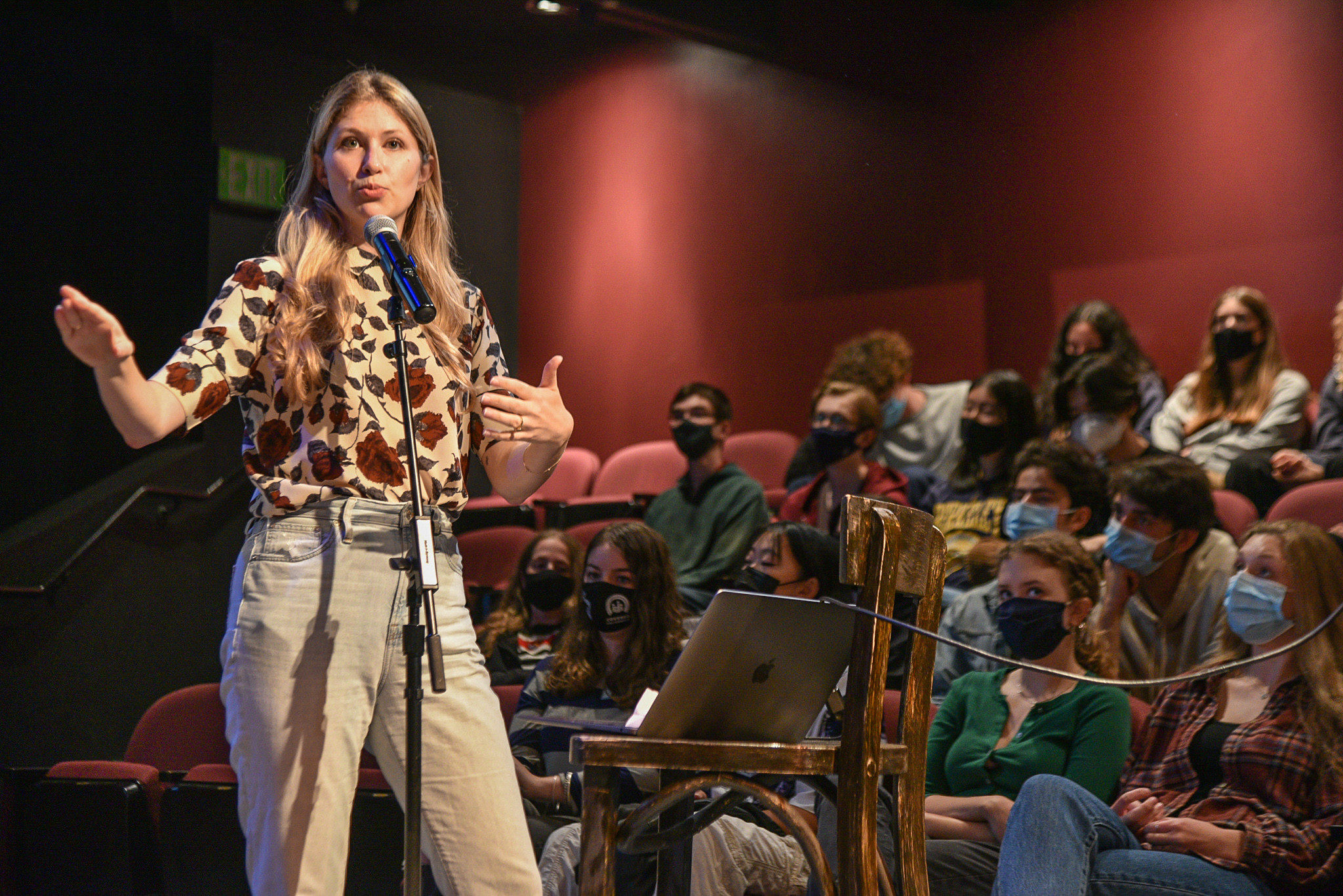The Berkeley High School (BHS) Women’s Student Union (WSU) held a Title IX “Know Your Rights” Workshop on September 27 at the Aurora theater.
Title IX protects people from discrimination on the basis of sex in educational programs such as BHS which receive funding from the federal government. The workshop covered students’ rights under Title IX, including LGBTQ+ students’ rights and the rights of survivors. The co-presidents of the WSU, Maize Cline, Ava Nemeth, Lindsey Chou, and Neva Zamil led the workshop with Alexandra Brodsky, a New York based attorney with the organization Public Justice (PJ).
In her presentation, Brodsky discussed what obligations schools have under Title IX. She said schools are required to provide accommodations to students who have been harassed, even if the student does not want to move forward with an investigation. Accommodations can include free counseling or tutoring for a student who has missed school due to harassment.
“Even if someone does not want the person who hurt them investigated—let’s say they … don’t have the emotional bandwidth or don’t want to see the person who hurt them punished—the school still has to take action to make sure the survivor can stay in school,” she said.
Schools can also put together a “safety plan” without an investigation or before an investigation is complete, which creates a way for a survivor and the person who harassed them to avoid each other in school.
Brodsky said if students do choose to file a complaint, schools are obligated to conduct investigations on reports of sexual harassment seperately from the police. “A lot of people say ‘If the police investigated it and they decided not to press charges, why would you expect the school to do anything about it?’” she said. “But, these are completely separate procedures.”
Brodsky also discussed protections under Title IX that apply specifically to LGBTQ+ students. She said California State law acknowledged dicrimination on the basis of gender identity or sexual orientation as a form of sex discrimnation before federal law began to do so recently. Federal law applies to the whole country, whereas California law is only applicable to the state.
“There are many ways in which California law is better than federal law,” she said. “California law is often more specific and better for students.”
The workshop ended with a question and answer period, where attendees asked Brodsky general questions about Title IX and about specific situations at BHS.
The workshop helped Uma Kiyawat, a freshman at BHS and member of BHS Stop Harassing, gain a stronger understanding of Title IX.
“It stuck out to me that I didn’t know what Title IX really was before,” she said, “ … It was nice to know that if you report something, if the school is following Title IX well, there are ways that you can be supported.”
The WSU also talked about its current lawsuit against the U.S. Department of Education over new Title IX regulations put into place by Betsy Devos in 2020, which WSU believes limit protection for students. The organization Brodsky works with, PJ, is representing WSU in the lawsuit with The National Center for Youth Law, and Correia & Puth, PLCC.
Under the new regulations, schools are not required to take action if harassment of a student is considered “pervasive or severe” but not both or if the harassment took place off campus outside of a school event, among other changes from the previous guidelines.
“Under Devos’s rules, schools no longer have to address harassment that happens at a party over a weekend, even if the victim has to sit down next to the person that hurt them in class on Monday and try to focus,” Brodsky said.
Brodsky also addressed Title IX’s application to sports. She said under Title IX, schools have to provide equal opportunities and support or students of different genders to participate in sports.
“What we see in a lot of schools now is that maybe on paper it looks equal, but if you look at the girls’ and boy’s locker rooms, you realize that they do not have the same kind of support from the school,” she said.
The WSU is currently collecting stories of sexual harassment at BHS for their lawsuit. They provided a QR code at the workshop which led to a google form used to report students’ experiences with sexual harassment to the club. Reports can be anonymous. Zamil said submitting the form does not make a story part of their lawsuit, and stories will not be reported to BHS or the police.
“This can be any story that you have experienced, something you heard in the hallways, or something that happened to a friend if they’re willing to let you share,” Zamil said. “It’s a great resource for us to add onto this lawsuit, which will have really big implications for all of us.”
A link to the Google Form and recordings of the workshop are on WSU’s instagram, @bhs.wsu.





